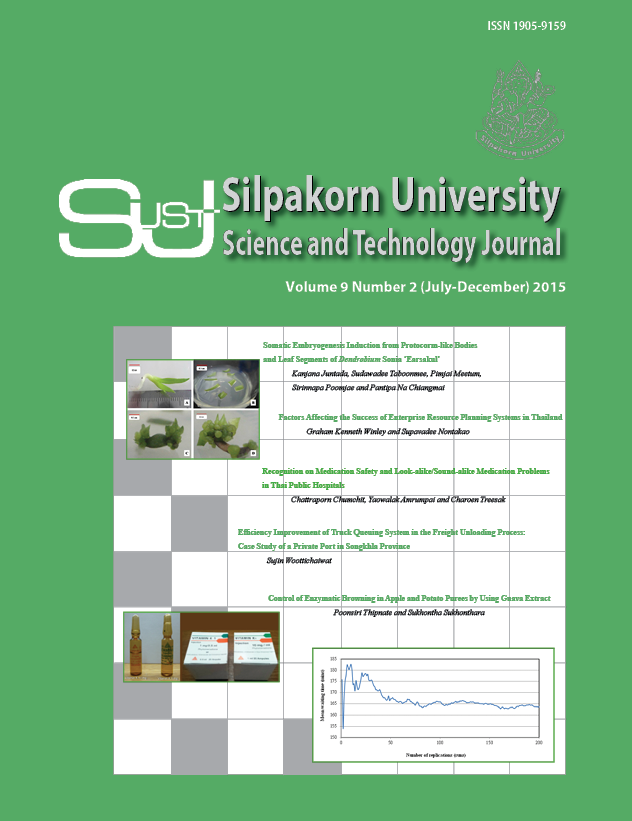Recognition on Medication Safety and Look-alike/Sound-alike Medication Problems in Thai Public Hospitals
Main Article Content
Abstract
Little is known about medication safety policy recognition and look alike/sound-alike (LASA) medicationerror magnitude among Thai public hospitals. We aimed to determine recognition on and implementationof Thai national medication safety policy, and type and frequency of LASA errors. Questionnaires weremailed to all 971 public hospitals during September 2009 to January 2011. We found that, of 479 informants,the majorities of all returned questionnaires were from community hospitals. Of all informants, the majoritiesconsisted of 226 pharmacy department heads and 353 staff pharmacists. The majority knew about the nationalpolicy on medication safety (88.52%). Most hospitals reported complete implementation of medicationsafety measure (MSM) (78.29%) while 19.41% reported partial implementation. Most hospitals (82.46%)ranked LASA incidents the most troublesome cause of medication safety but the most carried out MSM wasfor preventing high alert drug errors. Most given LASA errors were commonly found in various hospitals.Generic name LASA errors were most frequently reported. This study aimed to achieve a systematic approachby means of medication safety measures to alleviate the related problems at all healthcare system levels.
Downloads
Article Details
References
Hicks, R. W., Becker, S. C., and Cousins, D. D., eds. (2008). MEDMARX® Data Report. A report on the relationship of drug names and medication errors in response to the Institute of Medicine’s call to action., Center for the Advancement of Patient Safety, US Pharmacopeia, Rockville, MD.
Hoffman, J. P. (1990). More on Losec or Lasix? New England Journal of Medicine, 323(20): 1428.
Micromedex 2.0. (2012a). Atenolol Dosing & Indication.
Micromedex 2.0. (2012b). Propranolol Hydrochloride Dosing & Indication.
National Coordinating Council for Medication Error Reporting and Prevention. (2001). NCC MERP Index for Categorizing Medication Errors. vol. 2012.
Pattanajak, C. (2005). Inpatient Dispensing Error. Thai Journal of Hospital Pharmacy, 15(1): 38-46.
Pincus, J. M. and Ike, R. W. (1992). Norflox or Norflex? New England Journal of Medicine, 326(15): 1030-1030.
Somton, P., Thanajantaporn, N., and Ninsuwankosit, T. (2006) Medication Error in Inpatient Department at Bumrasnaradura Institute. Journal of Health Science, 15(4): 606-616.
The Department of Health Service Support and The Ministry of Public Health. (2007). National Patient Safety Goal 2007 - 2008, Ministry of Public Health, Nonthaburi.
The Healthcare Accreditation Institue (Public Organization). (2006). 2006 HA - Thailand Patient Safety Goals. Quality Care, 2(special): 1-2.
The Institute for Safe Medication Practices Canada and The Healthcare Insurance Reciprocal of Canada. (2004). Look-Alike/Sound-Alike Drug Names: Can We Do Better in Canada?. ISMP Canada Safety Bulletin, 4: 1-2.
WHO Collaborating Centre for Patient Safety Solutions. (2007). Look-Alike, Sound-Alike Medication Names. Patient Safety Solutions 1 (May 2007).
Wipaswatcharayothin, Y. and Thamasithiboon, M. (2008). Medication errors investigated in Chumphon Khet Udomsakdi Hospital. Clinical Pharmacy, 15(2): 151-161.


